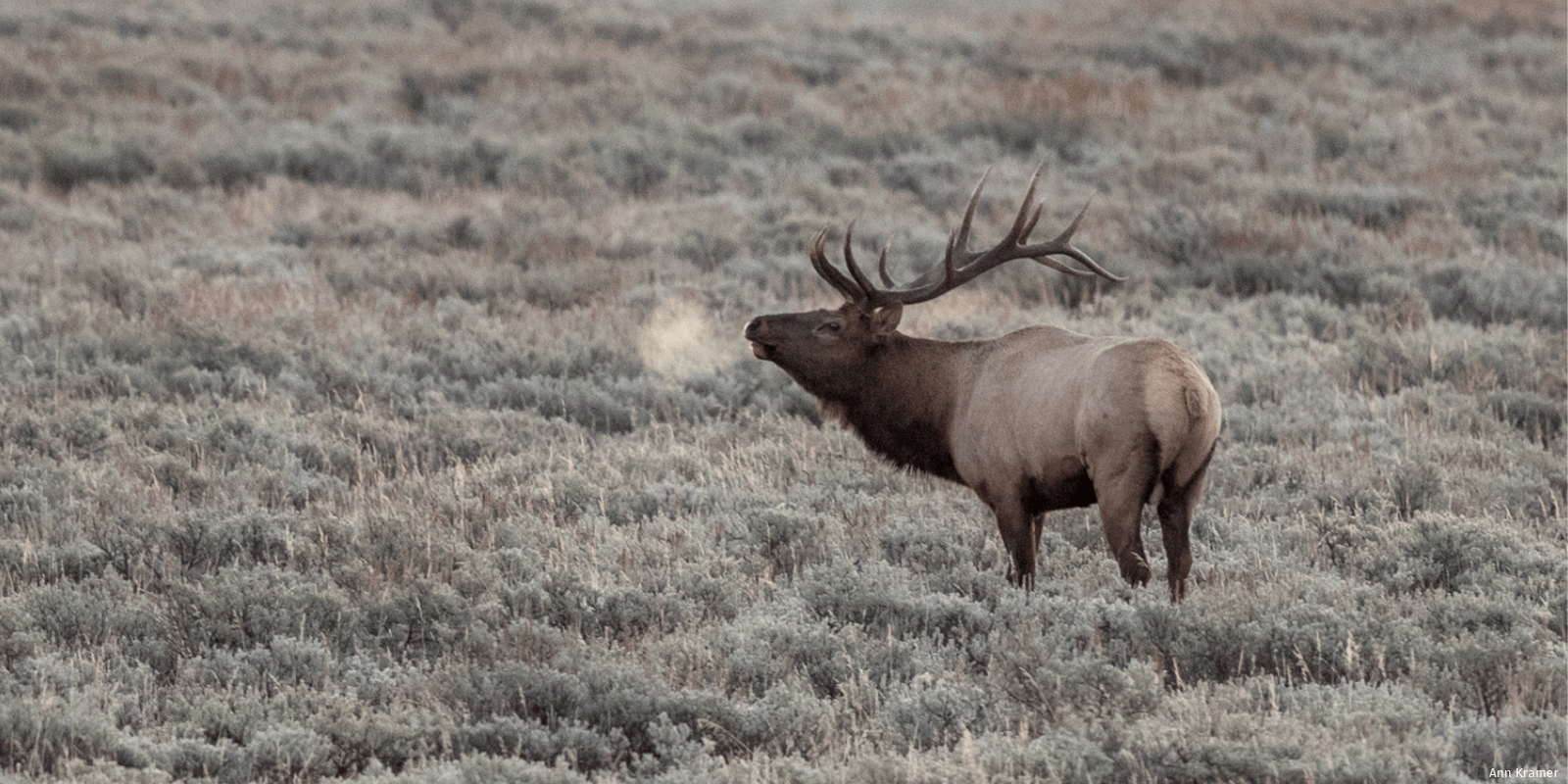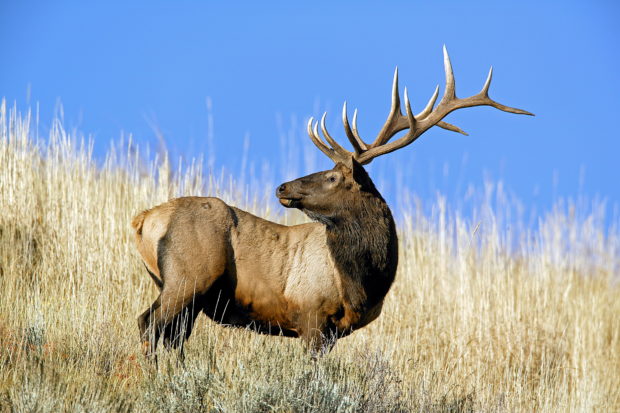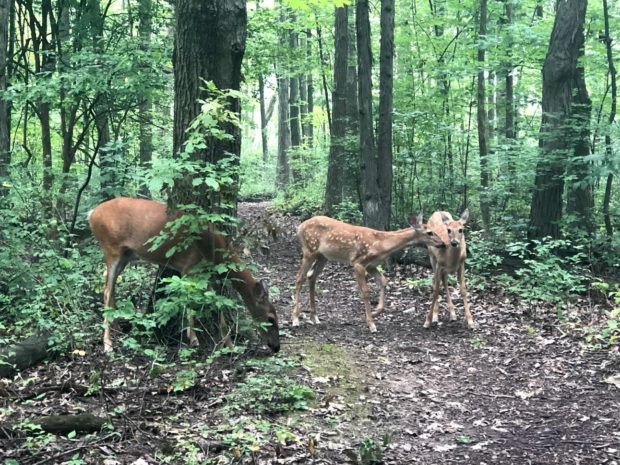We have much more to do and your continued support is needed now more than ever.
Deer and Elk Need Funding and Research to Fight Chronic Wasting Disease

Zombie deer. Miracle cures. The headlines have been flying around chronic wasting disease (CWD) in deer, elk and moose lately, but the sensational isn’t always accurate. Deer do not turn into zombies, nor will they turn humans in to zombies. And the miracle cure suggested at a February news conference in Pennsylvania turns out to be little but old and unverified research that rejects the scientific consensus. Proposed federal legislation, though, could help with what is really needed to combat CWD: research and funding.
Chronic wasting disease is a serious issue affecting wildlife and it has no easy solutions. CWD is a prion disease, related to “mad cow disease,” that leaves cervids like deer, elk, and moose emaciated, wasting away. It is always deadly, either directly or through the effects of its symptoms, though wildlife can be infected and spread the disease long before they show symptoms.
While it has not jumped the species barrier to humans yet, people are advised not to eat the meat of a deer or elk infected by CWD. Hunters in areas positive for CWD should test their game before cooking it. As the disease spreads, these concerns could also depress the hunting participation that pays for the bulk of wildlife conservation efforts.
Sensational headlines and snake oil won’t stop the spread of CWD: it will take scientific research into how it’s spread and funding for strapped state wildlife agencies trying to manage it. And that’s exactly what two recently-introduced bipartisan, bicameral packages of federal legislation could provide.
CWD Management Act

The Chronic Wasting Disease Management Act (CWD Management Act) was introduced in both the House (H.R. 1550) and the Senate (S. 689) by Reps. Ron Kind (D-Wisc.) and Jim Sensenbrenner (R-Wisc.) and Sen. Jon Tester (D-Mont.) in March.
It authorizes $35 million, administered by the Secretary of Agriculture through Animal and Plant Health Inspection Service (APHIS), to be granted out to states and tribal nations to develop and implement CWD management and response plans, and another $10 million (H.R. 1550) to $25 million (S. 689) for CWD research grants.
“Additional funding would greatly help our disease surveillance efforts by giving wildlife disease biologists more resources and potentially more positions,” said Aaron Morehead, chronic wasting disease biologist for the Wyoming Game and Fish Department. “Additional disease personnel would not only help in the day-to-day operations but also long term with more eyes in the field looking for diseases, especially CWD.”
The CWD Management Act would allocate $20 million for state agencies, universities, and research centers and $5 million for tribal nations. It also includes $10 million for rapid response to CWD outbreaks.
It prioritizes the distribution of its funding based on the scope of CWD incidence in the state or on tribal lands; state or tribal financial commitment to CWD management, monitoring, surveillance, and research; the existence of comprehensive state or tribal CWD programs and policies integrated between state agencies; and rapid response to new outbreaks of CWD.
“Chronic Wasting Disease is a threat to Montana’s big game, our hunting opportunity, and ultimately our outdoor economy,” said Dave Chadwick, executive director of the Montana Wildlife Federation. “Senator Tester’s bill will marshal the resources that our wildlife managers need to fully understand this disease and rapidly respond to outbreaks.”
Its research grants will be used to study sustainable deer and elk harvest management practices to limit CWD’s spread; management experiments and studies for long-term suppression of CWD; analysis of harvest management practices which increase CWD occurrence; factors contributing to local emergence of CWD, increased occurrence, and transmission pathways; and methods and products to detect and decontaminate infectious prions containing CWD from natural environments and inorganic materials.
“The funding and help with research outlined in the legislation by Representatives Kind and Sensenbrenner would give the Wisconsin Department of Natural Resources the kind of support it needs as it grapples with the spread of chronic wasting disease in the state,” said George Meyer, executive director of the Wisconsin Wildlife Federation.
CWD Study Act

In February, U.S. Reps. Ralph Abraham (R-La.) and Marc Veasey (D-Texas). introduced legislation (H.R. 837) to authorize a study of the pathways through which CWD is spread. Matching legislation was introduced in the U.S. Senate (S. 382) by Sens. John Barrasso (R-Wyo.), Michael Bennet (D-Colo.), and Doug Jones (D-Ala.)
The Chronic Wasting Disease Transmission in Cervidae Study Act (CWD Study Act) would direct the U.S. Geological Survey (USGS) and APHIS to enter into an agreement with the National Academy of Sciences to study how CWD is spread in wild, captive and farmed deer.
The study will include infection rates and frequency for each pathway and mechanism, human and environmental factors in new CWD cases, mapping CWD patterns and distribution,and identify gaps in scientific knowledge and prioritize research projects to fill those gaps. It will also review best management practices and management plans currently developed by APHIS, USGS and state agencies.
“Chronic wasting disease is one of the greatest threats facing deer and elk. It also jeopardizes the vital conservation funding that hunters generate through license sales and excise taxes on sporting equipment,” said Mike Leahy, director for wildlife, hunting, and fishing policy for the National Wildlife Federation. “Thank you to Senators Barrasso, Bennet, and Jones and Representatives Abraham and Veasey for working across the aisle to support research that will help state wildlife managers conserve bedrock species of our outdoor heritage.”
National Wildlife Federation Policy
The National Wildlife Federation adopted a resolution in 2017 calling for the creation of a federal Fish and Wildlife Disease Trust Fund to respond to wildlife diseases like CWD to provide rapid response funding to states for fish and wildlife disease outbreaks. It was sponsored by Michigan United Conservation Clubs – whose then-executive director Dan Eichinger now serves as director of the Michigan Department of Natural Resources (DNR) – after seeing the Michigan DNR’s resources stretched thin from its response to the spread of CWD in its free-ranging wild deer, first detected in 2015.
“Biologists and veterinarians have identified CWD as an important topic for the future of deer management and conservation. In order to conduct real world, applied management research projects to evaluate the effectiveness of combatting the disease, we need support from the political arena,” said Chad Stewart, deer and elk biologist for the Michigan Department of Natural Resources. “We need our elected officials to understand the importance of this disease, and we need them to support funding dedicated towards finding answers for this disease.”





















